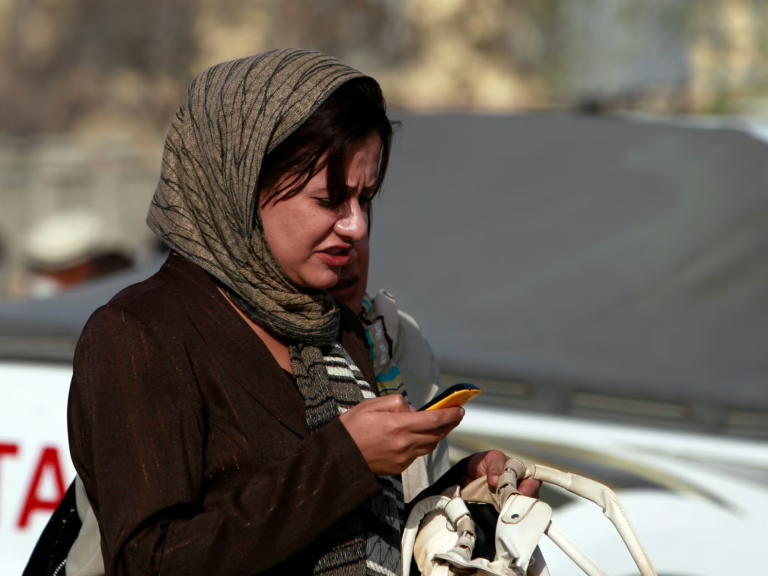Afghanistan is currently experiencing a comprehensive telecommunications blackout, enforced by the Taliban as part of their campaign against what they term “immoral activities.”
According to Netblocks, an international internet monitoring organization, several Afghan networks were disconnected on Monday, with telephone services also severely restricted. This has culminated in what Netblocks describes as a “complete internet shutdown” affecting the country’s 43 million residents.
The shutdown unfolded in stages throughout Monday, ultimately impacting telephone communications. The Taliban have previously expressed concerns about online content they consider inappropriate, including pornography. Earlier this month, fiber-optic internet connections were severed in certain provinces, with officials citing moral reasons for these actions.
Netblocks highlighted that this blackout will drastically reduce the population’s ability to communicate with the outside world.
This marks the first nationwide internet blackout since the Taliban assumed control, posing a significant risk of isolating Afghanistan at a time when humanitarian aid is critically needed, especially following a recent magnitude-6 earthquake in the eastern region.
Which Telecom Services Are Being Limited?
The Taliban initiated internet restrictions earlier this month. On September 16, a spokesperson from Balkh province announced a total ban on fiber-optic internet in the northern region.
He explained on social media that this step was taken to curb “immoral behavior.” Similar limitations were reported in northern provinces such as Badakhshan and Takhar, as well as southern provinces including Kandahar, Helmand, and Nangarhar.
Cloudflare Radar, a global internet traffic analytics platform, noted that Kabul experienced the steepest decline in connectivity, followed by Herat in the west and Kandahar in the south.
On Monday, TOLOnews, an online television channel, reported that authorities have mandated a one-week deadline to discontinue 3G and 4G mobile internet services nationwide, leaving only 2G networks operational.
Telephone communications have also been disrupted, as they rely on the same fiber-optic infrastructure as internet services.
Who Is Most Impacted?
Internet and Communication
TOLOnews warned that its news broadcasting and internal operations would face interruptions due to the shutdown.
Both the Associated Press and AFP news agencies reported difficulties reaching their Kabul offices.
On Tuesday, Al Jazeera attempted to contact individuals in Kunar, Jalalabad, and Kabul via WhatsApp and phone calls from abroad, but none were successful.
Afghan expatriates, including journalist and human rights advocate Nilofar Ayoubi, have expressed frustration over being unable to connect with family members inside Afghanistan.
I haven’t been able to reach my mother in Afghanistan for the past nine hours due to the internet blackout. Tonight, I feel just as hopeless and powerless as I did on the night of August 15, 2021. https://t.co/yX4ycP4sMK
– Nilofar Ayoubi 🇦🇫 (@NilofarAyoubi) September 29, 2025
Air Travel
Flight operations at Kabul International Airport have also been affected. Flight tracking service Flightradar24 reported that nine flights scheduled for Tuesday were canceled, although other flights proceeded as planned.
Even prior to the Taliban’s return to power in August 2021, Afghanistan’s economy was fragile. Nearly half the population lived below the poverty threshold, with unemployment at 11.7% in 2020. Additionally, over a third of employed individuals earned less than $1.90 daily, according to economist Sheela Samimy, a former Afghan Ministry of Finance official.
The telecom blackout threatens to deepen these economic challenges.
Online marketplaces like Aseel, which empowers Afghan artisans-predominantly women-to sell handcrafted jewelry, carpets, and pottery globally while setting their own prices, are expected to suffer as connectivity is lost between vendors and buyers.
Aseel also facilitates international donations for humanitarian aid, which will be hindered by the shutdown.
Moreover, Afghans who rely on social media platforms such as YouTube for income will face significant disruptions.
Banking and Healthcare
Diplomatic sources informed the BBC that the internet blackout could disrupt banking operations nationwide, as well as business activities and hospital services.
What Is the Taliban’s Position?
AFP reported that a Taliban official confirmed the fiber-optic network used for telecommunications would be shut down, affecting “eight to nine thousand telecom towers.” The blackout is expected to continue “until further notice.”
Since their 2021 takeover, the Taliban have enforced strict societal controls based on their interpretation of Islamic law. Recently, these restrictions have intensified.
In September, Afghan women employed by the United Nations were barred from entering UN offices. This follows bans on women working in various sectors and prohibitions on girls attending high school since 2021. Women are now also excluded from higher education.
Many women and girls have turned to online education provided by foreign educators and charitable groups. The current internet clampdown threatens to eliminate these vital learning opportunities.
The Taliban claim to uphold women’s rights within the framework of their religious beliefs.
However, Afghan women’s rights advocate Sanam Kabiri, based in Pakistan, criticized the regime, stating: “The Taliban are exploiting every possible means to oppress the population.”
She added, “What more do these backward men from another era want from our already suffering people?”
Could This Affect Earthquake Relief Efforts?
On August 31, a powerful 6.0 magnitude earthquake struck eastern Afghanistan, resulting in over 2,200 deaths and approximately 3,600 injuries, according to Taliban officials. Rescue and recovery operations are ongoing, with hundreds of thousands displaced.
Women have been largely excluded from relief work, primarily because the Taliban prohibit them from working with NGOs, despite the country’s heavy reliance on humanitarian aid.
In many regions, women are not permitted to travel without a male guardian, complicating their ability to both receive and provide assistance following the disaster.
Experts warn that the internet blackout could severely hinder coordination and real-time information sharing among local authorities and aid organizations, undermining the effectiveness of ongoing relief efforts.
















